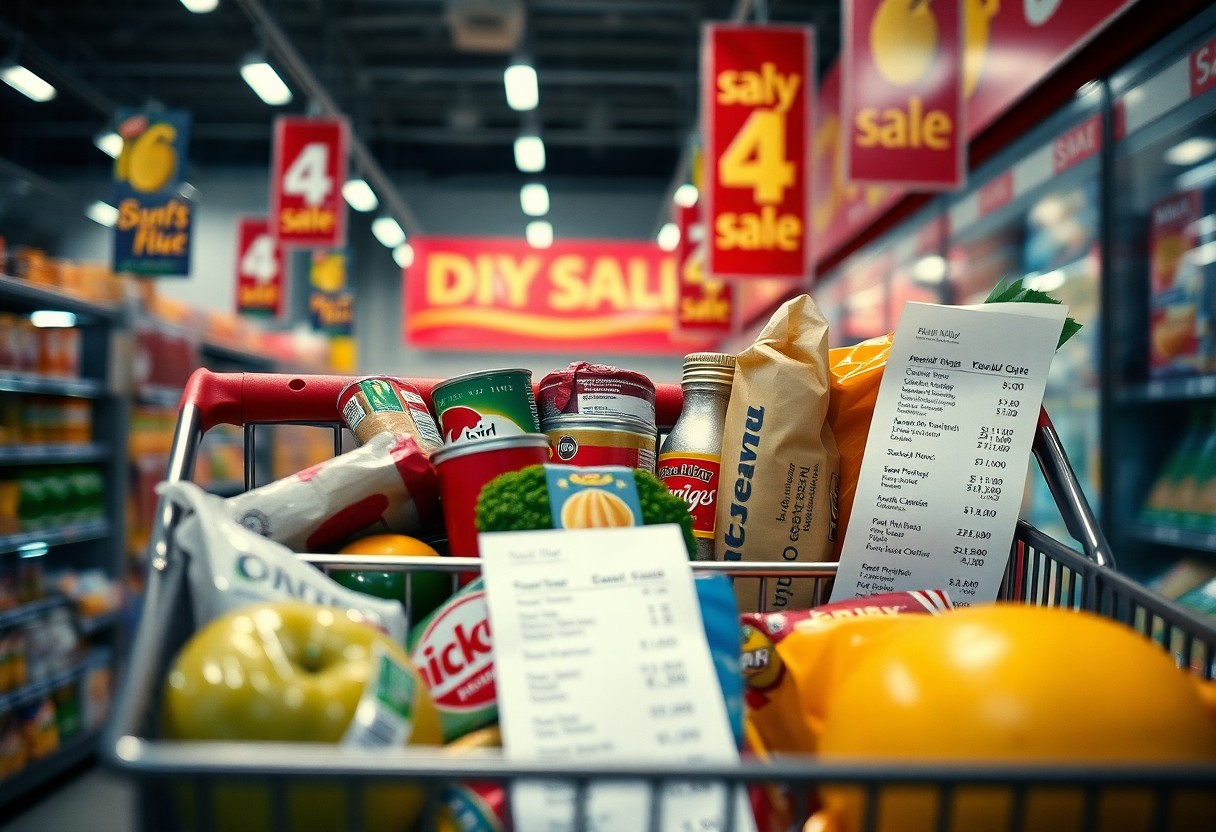Many shoppers overlook simple practices that can lead to wasted money at the grocery store. By identifying and addressing these common errors, you can optimize your spending and make smarter purchasing decisions. This guide will help you to avoid unnecessary expenses and maximize the value of your groceries, ensuring that your hard-earned cash goes further. Dive into these tips to keep your budget intact while still enjoying quality food.

Understanding Common Grocery Shopping Mistakes
Identifying common grocery shopping mistakes can help streamline your budgeting process. Many people frequently fall into traps like buying items on impulse or failing to compare prices. A systematic approach can reveal unnecessary spending patterns and allow you to adjust your habits. For instance, evaluate your receipts weekly to discover which items contribute most to your overspending.
How to Identify Overspending Patterns
To pinpoint where you overspend, track your grocery purchases over a month. Look for frequent impulse buys, trendy items you rarely use, and price discrepancies between stores. Consolidating this data helps highlight specific habits causing financial strain, making it easier to create strategies for improvement.
Tips for Budget-Friendly Grocery Shopping
Implementing budget-friendly strategies can significantly reduce your grocery bills. Start by creating a detailed shopping list and sticking to it, while also utilizing coupons and discount apps. Planning meals based on weekly sales can also uncover great savings. Assume that small adjustments, like shopping during sales and prioritizing necessarys, can lead to notable savings.
- Create a shopping list before visiting the store.
- Use coupons and cashback apps to maximize savings.
- Plan meals around grocery sales each week.
- Avoid impulse purchases by sticking to your list.
Explore additional ways to save by matching store promotions with loyalty programs or participating in bulk purchases for non-perishable items. This can help you secure lower costs on necessities over time. Assume that making these conscious choices during your shopping trips can enhance your financial health.
- Match promotions with loyalty program offers.
- Consider bulk buying for non-perishable items.
- Buy store brands instead of name brands.
- Keep track of your spending as you shop.

Factors Influencing Grocery Spending
Several factors can significantly alter your grocery budget. Consider your location, as prices vary widely between urban and rural areas. Seasonal changes impact the availability and cost of fresh produce. Additionally, personal habits such as shopping frequency and coupon usage play a role in overall spending. Take a moment to analyze how these elements affect your choices. 11 Grocery Shopping Mistakes That Are Costing You Money can guide you in making healthier financial decisions.
How to Evaluate Sales and Promotions
Understanding how to effectively evaluate sales and promotions prevents unnecessary spending. Look for unit prices to determine the best deals on products, rather than solely relying on discount percentages. Pay attention to expiration dates and stock your pantry smartly, avoiding last-minute purchase traps. Educate yourself on seasonal promotions for greater savings in the long run.
Tips for Avoiding Impulse Purchases
To minimize impulsive buys, establish a strict shopping list and stick to it while navigating the aisles. Set a budget before entering the store and track your spending in real-time. Avoid shopping when you’re hungry, as this can lead to purchasing unnecessary items. By maintaining focus on your list, you can effectively curb excess spending. Any deviation from this strategy can derail your grocery budget.
Implementing additional strategies can further reduce impulsive purchases. Aim to shop during off-peak hours, when stores are less crowded and distractions minimized. Consider online grocery shopping to prevent temptation from appealing displays. Utilize cash instead of cards to help reinforce your spending limits. Any lapse in these habits can negatively impact your grocery costs.
Strategic Shopping Techniques
Implementing strategic shopping techniques can significantly cut your grocery bills. Take time to invest in creating an effective shopping list and planning your meals. Adopting these methods will help you avoid impulse purchases and wasted food. For more insights, refer to 10 Grocery Shopping Mistakes That Are Costing You Money.
How to Create an Effective Shopping List
Start by examining your pantry and fridge to list items you need, categorized by sections of the store. A cohesive shopping list leads to increased efficiency and ensures you won’t forget critical ingredients, ultimately preventing wasted trips and purchases. Focus on specific products rather than vague items to keep your spending in check. Assume that every time you deviate from this list, there’s potential for spontaneous buys that can add up.
Tips for Meal Planning and Preparation
Prioritizing meal planning prevents last-minute takeout and reduces food waste. Set aside time each week to map out meals based on what you already have and what is on sale. This not only enhances your culinary skills but also keeps you within your budget. Use versatile ingredients that can be repurposed throughout the week. Assume that planning allows you to make healthier choices while saving both time and money.
- Meal planning can reduce food waste.
- Versatile ingredients lend flexibility.
- Specific recipes avoid random buying.
- Assume that consistency will yield savings over time.
Incorporating various meal prep techniques, such as batch cooking and freezing leftovers, can maximize your grocery budget. Prepping meals not only saves time during busy weeks but also ensures you stick to healthier eating habits and resist fast food temptations. This foresight in preparation can drastically reduce unnecessary expenses. Assume that implementing these methods transforms your approach to grocery shopping.
- Batch cooking saves time and money.
- Freezing leftovers reduces waste.
- Healthier meals cut down on takeout.
- Assume that proper planning leads to significant savings.
The Importance of Staying Organized
Staying organized while grocery shopping helps you avoid impulsive purchases and wasted food. A well-structured plan ensures you buy only what you need, saving both time and money. Keeping your shopping list aligned with the layout of the store increases efficiency and minimizes the chances of forgetting important items.
How to Organize Your Pantry and Fridge
Organizing your pantry and fridge maintains visibility of your stock and prevents food waste. Use clear containers for bulk items, label everything, and group similar products together. Always store items with shorter expiry dates in the front, ensuring you use them first. This practice not only saves money but also promotes easier meal planning.
Tips for Tracking Expiry Dates and Inventory
Keeping track of expiry dates and inventory can significantly reduce food wastage. Create a simple inventory list or use apps designed for this purpose. Update it regularly, noting upcoming expiry dates to prioritize items that need to be used first. This method keeps your meals fresh and your budget intact.
- expiry dates
- inventory
- organization
Using reminders or color-coded labels can further enhance your tracking system. For instance, a red label for items nearing their expiry date can prompt you to use them sooner. Additionally, consider maintaining a whiteboard in your kitchen to jot down items that need replenishing. After implementing these strategies, you’ll notice a significant reduction in food waste and increased savings.
- reminders
- color-coded labels
- budget
Utilizing Technology in Grocery Shopping
Leveraging technology can transform your grocery shopping experience and significantly reduce costs. From apps that track prices to online delivery services, tech advancements offer diverse tools to help you stay within budget. Using these resources effectively not only streamlines your shopping but also empowers you to make informed decisions, ensuring you get the best deals available.
How-to Use Apps and Tools for Savings
Apps like Ibotta and
Tips for Online Shopping Efficiency
Planning and organization are imperative for efficient online grocery shopping. Create a detailed shopping list and stick to it to avoid unplanned purchases that can inflate your cart total. Use tools like
- create a detailed shopping list
- use comparison price sites
- take advantage of bulk buying
Organizing your online shopping can include scheduling regular purchases for items you frequently buy, utilizing subscription services for discounted prices, and always checking for promo codes before checkout. These strategies not only keep your expenses in check but also ensure you benefit from additional savings offered by online platforms. The focus should be on making informed choices that align with your budget.
- schedule regular purchases
- utilize subscription services
- check for promo codes

Avoiding Common Pitfalls
Identifying common grocery shopping pitfalls can save you significant amounts of money. One of the biggest traps is buying items on sale that you don’t need just because they seem like a good deal. Instead, scrutinize your shopping list against what’s advertised, ensuring that you’re only purchasing what will be beneficial for your household. Always keep in mind how such purchases can impact your budget.
How-to Recognize Marketing Traps
Marketing tactics can easily mislead you into overspending. Watch out for items placed at eye level, flashy sales signs, and bulk discount promotions. These strategies are designed to draw your attention and manipulate your shopping decisions. Question whether you truly need a product or if it’s simply a marketing lure meant to entice you into unnecessary spending.
Tips for Making Smart Choices
Smart grocery shopping involves making informed decisions based on your needs. Start by creating a detailed shopping list and sticking to it, which minimizes the chances of impulse buys. Use unit pricing to compare cost-per-amount between brands, ensuring you’re getting the best value. Be wary of perishables in bulk; while they can be a good deal, they require careful planning to avoid spoilage. This keeps your budget intact.
- Create a detailed shopping list
- Use unit pricing for comparisons
- Avoid bulk perishables if not needed
Incorporating these strategies helps you make smarter grocery choices. By ensuring that all selections fit within your budget and are genuinely needed, you reduce the likelihood of wasting money on impulsive purchases. Prioritize items that serve your household’s actual needs over catchy sales promotions. This is a significant step toward responsible grocery shopping.
- Prioritize genuine needs
- Be cautious of catchy promotions
- Plan purchases to avoid waste
Summing up
The mistakes you make while grocery shopping can significantly impact your budget. By avoiding common errors such as shopping without a list, succumbing to impulse buys, and not comparing prices, you can make smarter choices that save you money. Focus on planning meals, utilizing coupons, and assessing bulk purchases to maximize your savings. Being aware of these pitfalls empowers you to shop efficiently and keep your expenses under control.
FAQ
Q: What are common grocery shopping mistakes that increase spending?
A: Common mistakes include shopping without a list, buying items not on sale, ignoring unit prices, being unaware of expiration dates, and shopping while hungry. These habits lead to unnecessary purchases and higher bills.
Q: How can making a shopping list help save money?
A: A shopping list helps you stay focused on necessary items, reducing impulse buys and ensuring you only purchase what you need, ultimately lowering your overall cost.
Q: Why is it important to compare unit prices when shopping?
A: Comparing unit prices allows you to determine the best value for your money, helping you choose between different brands or package sizes more effectively.
Q: How can shopping on a full stomach prevent overspending?
A: Shopping after eating reduces cravings and the impulse to buy snacks or unnecessary items, leading to more mindful purchases and overall savings on your grocery bill.
Q: What should you do about expiration dates to avoid wasting money?
A: Check expiration dates before purchasing items, especially perishables, to ensure you can consume them before they spoil, preventing waste and additional spending on replacements.